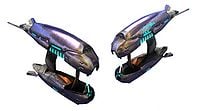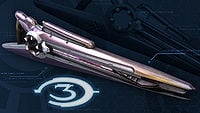Directed-energy weapon
From Halopedia, the Halo wiki
| This article does not meet the wiki's general standards and/or standards on layouts. You can help by cleaning this article. |
A Directed Energy Weapon (or DEW) is a type of weapon that delivers a non-solid projectile with a high enthalpy (kinetic and thermal). It transfers energy to a target for a desired effect. Some of these weapons are real or in development; others are at present only science fiction.
Lasers
- Main article: Laser
Pulse lasers are standard armament on Covenant warships, and equipped to UNSC Prowlers, used for precision strikes and for point-defense, intercepting fighters and missiles attacking the ship[1]. The UNSC currently uses a man-portable anti-vehicle laser weapon, the Spartan Laser or Galilean.
Plasma
- Main article: Plasma Torpedo

The Covenant also utilize a type of plasma, contained and guided by a controlled magnetic field, for extremely damaging strikes against UNSC targets, such as warships or glassing a conquered planet. Plasma is also used in the majority of Covenant small-arms, such as the Plasma Pistol, Plasma Rifle, Plasma Grenade and Fuel Rod Cannon.
Particle Beam Weapons
- Main article: Particle Beam Weapon
The Covenant also use accelerated particles as weaponry, such as the devastating capitol-ship mounted Energy Projector and the infantry Type-50 Sniper Rifle System. These weapons use charged or neutral particles, and may appear similar to lasers though the differences are extensive. Though humans have an understanding of accelerated particle technology they have not yet used it for weaponry.
As of the early 21st century, humanity had developed particle accelerators, but the machinery needed to work one is massive. At this time, humans also did not understand how particles at such speeds interacted with other matter.
